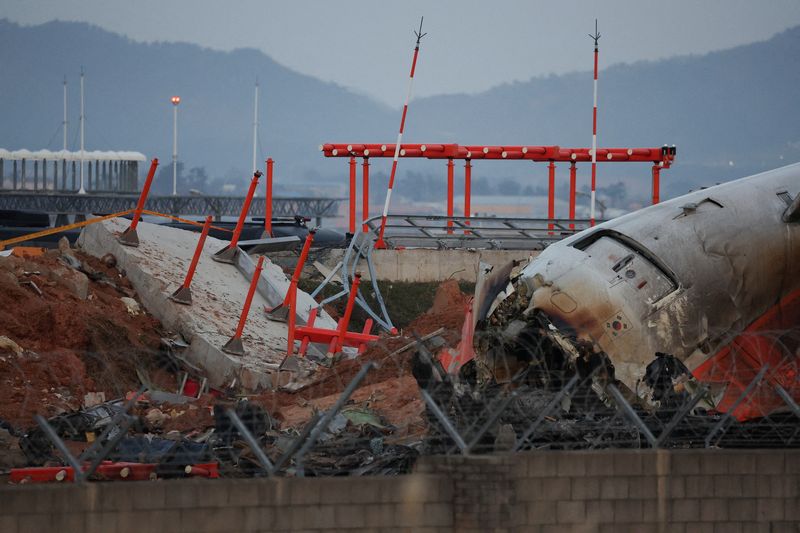
Written by Hyunjoo Jin and Dan Catchpole
SEOUL/SEATTLE (Reuters) – Before it suffered the deadliest crash in South Korea's history, budget carrier Jeju Air was moving fast: It carried record numbers of passengers and flew more planes than its domestic rivals and many of its global peers, data show.
Experts say the high “utilization rate” of Jeju Air's planes – the number of hours flown per day – is not a problem in and of itself, but it means scheduling enough time for required maintenance is crucial.
Authorities suggested that a bird strike contributed to the accident, but as part of the investigation into the accident on board a Boeing (NYSE:) 737-800, police raided the airline's office in Seoul to confiscate documents related to the operation and maintenance of the aircraft. .
“You're literally looking at everything,” said Anthony Brickhouse, an aviation safety and aviation accident investigation expert. “You'll start by listing their accident history and safety history. What kind of incidents have they experienced in the past, what happened, and what was done to correct the problems?”
Jeju Air told Reuters that it had not neglected maintenance procedures and would intensify its safety efforts. The Dec. 29 accident, which killed 179 people, was the airline's first fatal accident since its founding in 2005 and the first for any Korean airline in more than a decade.
The company's CEO, Kim Ee-bae – who has been banned from traveling abroad during the investigation – said at a press conference last week that Jeju's maintenance was in line with regulatory standards and that there were no problems maintaining the stricken plane during the pre-flight phase. You feed.
He acknowledged that the airline's safety measures had been inadequate in the past, but said improvements had been made.
Authorities have not said that poor maintenance contributed to the accident, and the exact circumstances behind the disaster remain unclear.
Besides the reported bird strike, authorities are looking into why the pilot rushed a second landing attempt after declaring a state of emergency, and why the landing gear was not deployed.
Investigators found the cockpit and flight data recorders, but did not reveal any details.
The country's transportation regulator is inspecting all 101 737-800 planes in South Korea — more than a third of which are operated by Jeju Air — focusing on how often and how well the planes are maintained, among other considerations.
Although it has not recorded any violations in the past two years, it was hit with more fines and suspensions for aviation law violations than any of its domestic competitors in 2020-2022, during and after the COVID-19 pandemic, records show.
According to Transport Ministry data on major airlines from 2020 to August 2024, Jeju Air was hit with fines of about 2.3 billion won ($1.57 million) and affected planes were kept out of service for 41 days, according to Reuters calculations based on the data.
The next most sanctioned airline, T'way Air, was hit with fines of 2.1 billion won and four days of suspension of operations during that period.
The data shows that Jeju Air flies more planes than any other major airline in the country, and it also outperforms most of its global counterparts, such as Ireland's Ryanair and Malaysia's AirAsia.
Jeju Air plane 7C2216 was flying from the Thai capital Bangkok to Muan in southwest South Korea at night when it landed on the belly of the plane, overshot the runway and caught fire after colliding with a bridge. The plane flew daily in 2024, according to flight data reviewed by Reuters.
Usage rates
High utilization rates are highly regarded in the industry as an indicator of economic efficiency, especially at low-cost airlines, experts say.
Jeju Air, which trails Korean Air and Asiana Air in terms of passenger volume in the country, saw record numbers from January to December 2024, according to Transportation Ministry data.
Monthly usage hours for passenger aircraft nearly doubled to 412 hours in 2023 from 2022, higher than Korean Air's 332 hours and Asiana Airlines' 304 hours, according to stock exchange filings.
The average working hours on passenger and cargo aircraft combined was 366 hours per month. Jane Eyre (KS:) averaged 349 hours, and Air Busan 319 hours, according to their records.
In 2024, Jeju Air flew its planes more each day — 11.6 hours — than almost any other airline that offers cheap tickets and flies only narrowbody planes, according to data from aviation analytics firm Cirium, which calculates utilization rates differently from earnings records.
Saudi Arabian Air was the only company that flew its planes for an average of 12.5 hours a day. The Vietnamese company VietJet was flying its planes for 10 hours a day. Ryanair's average usage was 9.3 hours, while Malaysian AirAsia's average usage was 9 hours. The Chinese Spring Airlines was flying an average of 8 hours a day.

“The use itself is not a problem,” said Sim Jae-dong, a professor of aircraft maintenance at Seihan University in South Korea. “But there may be greater fatigue for pilots, crew members and mechanics due to higher utilization rates.”
($1 = 1,453.9500 won)







